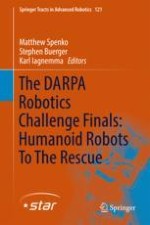2018 | OriginalPaper | Chapter
Team RoboSimian: Semi-autonomous Mobile Manipulation at the 2015 DARPA Robotics Challenge Finals
Authors : Sisir Karumanchi, Kyle Edelberg, Ian Baldwin, Jeremy Nash, Brian Satzinger, Jason Reid, Charles Bergh, Chelsea Lau, John Leichty, Kalind Carpenter, Matthew Shekels, Matthew Gildner, David Newill-Smith, Jason Carlton, John Koehler, Tatyana Dobreva, Matthew Frost, Paul Hebert, James Borders, Jeremy Ma, Bertrand Douillard, Krishna Shankar, Katie Byl, Joel Burdick, Paul Backes, Brett Kennedy
Published in: The DARPA Robotics Challenge Finals: Humanoid Robots To The Rescue
Publisher: Springer International Publishing
Activate our intelligent search to find suitable subject content or patents.
Select sections of text to find matching patents with Artificial Intelligence. powered by
Select sections of text to find additional relevant content using AI-assisted search. powered by
